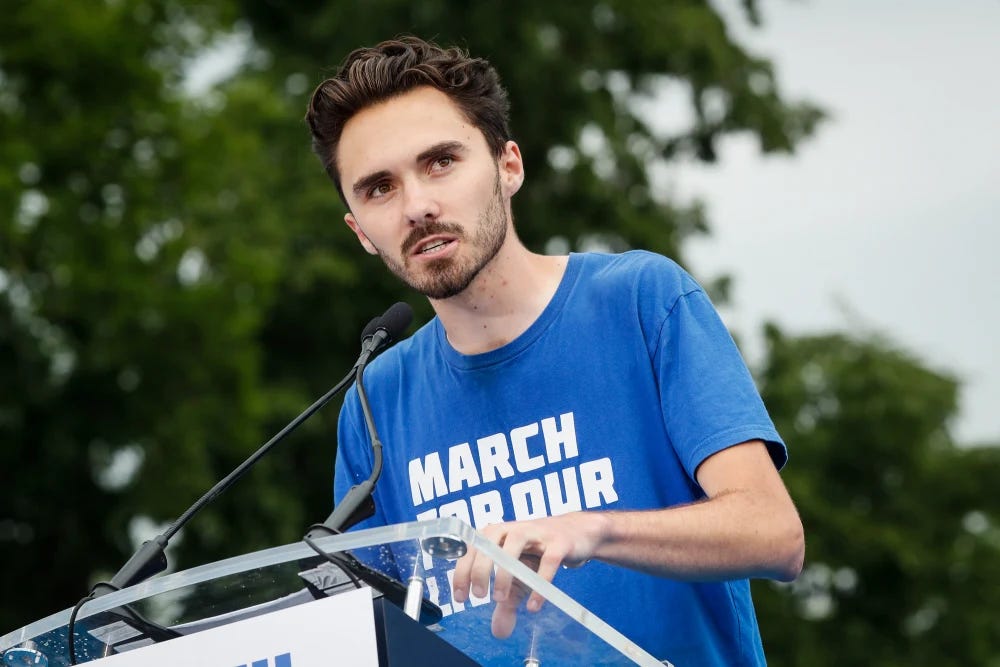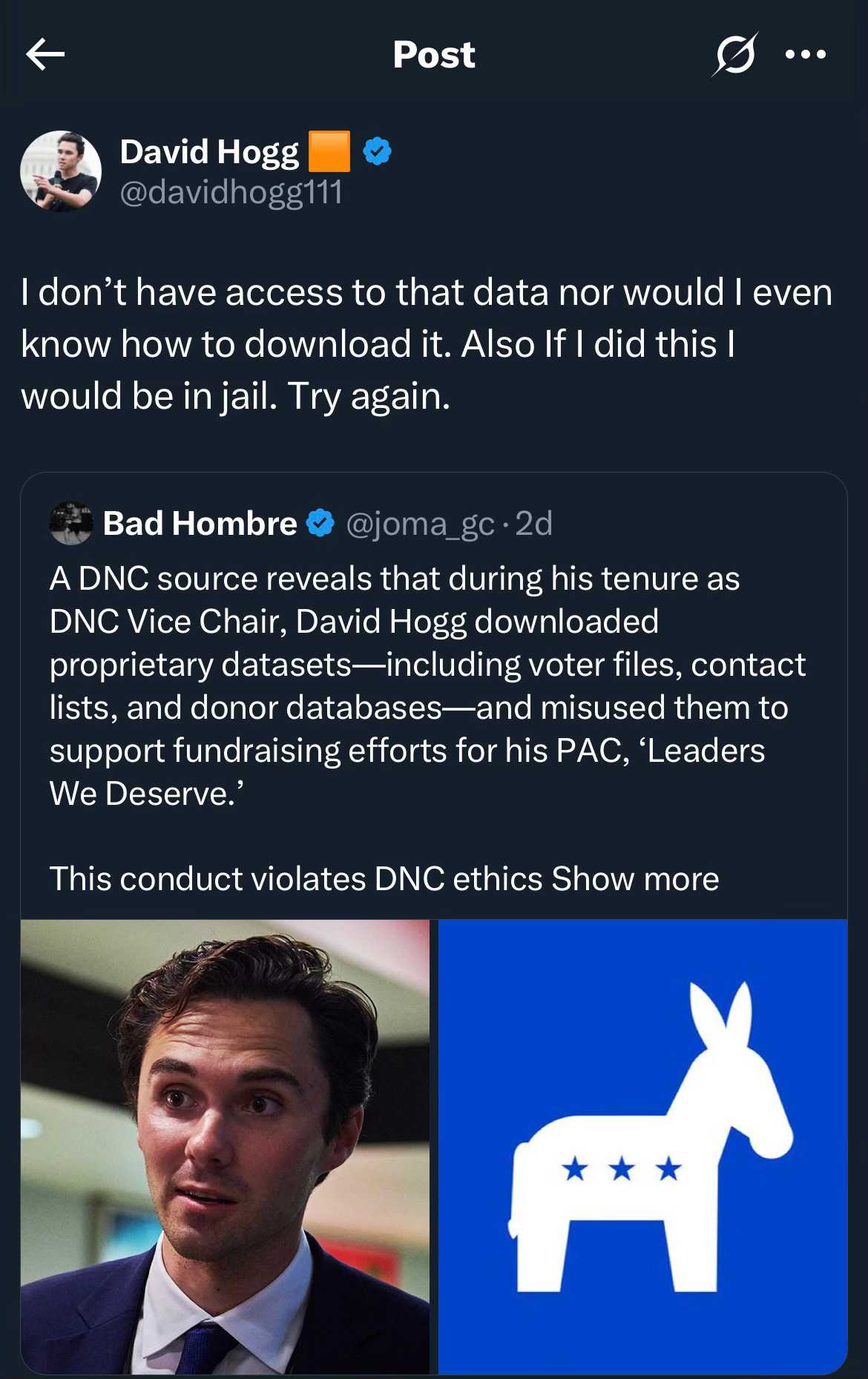David Hogg, the Democratic Party, and the Oligarchic US Constitution
The never-ending DNC war on independence in the party. By Lucas De Hart

This week, the central organs of the Democratic Party within the Democratic National Committee (DNC) decided to redo the intra-Party election of David Hogg and Malcolm Kenyatta to the position of DNC vice chairs. The procedural excuse used to justify the annulment of Hogg and Kenyatta’s victory came from Kalyn Free, who lost the election. Free claims the procedural violation has to do with a rule of “gender balancing.” The vice chair's vote supposedly violated this rule because it came down to a single vote on the candidates. Free submitted her complaint on February 28th. The nullification didn’t occur until Tuesday, May 13th.
There are three realities to keep in mind through this conversation that explain why this behavior by the DNC, which would otherwise seem so very off, is actually the modus operandi of the Democratic Party and its ideology:
The Democratic Party would rather lose elections than have any semblance of independence throughout its ranks.
The Democratic Party is one of two factions of constitutional uniformity that oppose democracy and support constitutional orthodoxy to keep its power.
The Democratic Party is under immense pressure and wants to stop any legitimate new threat of independence at the source before it has a chance to gain traction.
Now, what exactly has David Hogg done or said that stands to threaten the power of the central organs of the DNC?
Hogg is a founding member of March for Our Lives, a common-sense gun control organization that was created in the aftermath of the mass shooting at Marjory Stoneman Douglas High School in Parkland, Florida. Hogg went on to be a relentless and passionate advocate for not only gun control and mass shooting victims but also a long list of policies affecting young Americans. After graduating from Harvard in 2023, he co-founded Leaders We Deserve, a grassroots organization dedicated to electing young progressive Democratic Party candidates.
With the onset of Trump 2.0 and the race for a new Democratic National Committee Chair, Hogg ran for one of the vice chair positions and won well over the margin with 214.5 votes. Soon, Hogg began using his position to aggressively push for a Democratic Party more representative and inclusive of young people’s policy preferences. What got Hogg in trouble was his suggestion that the Party support primary challenges to incumbents that aren’t oppositional enough to Trump and GOP policies in safe blue districts. He even mentioned not pursuing this strategy in frontline swing districts.
That’s when the various central organs of the DNC began their war on Hogg. From MSNBC hosts to career strategists like James Carville, everyone lined up against him. Even his fellow vice chair up-and-comer, Malcolm Kenyatta, showed his true colors by attacking Hogg on MSNBC for having a “casual relationship with the truth.”
The Democratic Party doesn’t like members, or frankly, anyone in its ecosystem, who don’t stick to the script. From its absolutely dastardly intervention in 2016 to tank Bernie Sanders, to Obama’s phone calls in 2020 before Super Tuesday so everyone in the primary would again go against Sanders and support Joe Biden, to its blacklisting of progressive vendors and consultants in 2019; this is the Party's MO. You either toe the line and are obedient to the Party’s inner elite and interests, or the knives come out.
The independence of Bernie Sanders and AOC is much more powerful than anything David Hogg and his Leaders We Deserve represent, and yet the DNC feels immensely threatened by his bare minimum suggestions to turn the Party around. The Party’s current weakness shines through so clearly with these insecure tactics to quash anyone not obedient.
Personally, I don’t think David represents much of an overthrow of the establishment as much as a fairly moderate messaging over the last decade of “a big tent party.” However, the Party’s maneuverings should be a real tactical lesson for the US left and, in particular, the growing Movement for a Democratic Constitution.
On Tuesday, May 27th, the DNC continued its shadow war against Hogg and used this episode as an example of what it does to those exercising independence of any kind. An anonymous DNC internal source said Hogg had access to “proprietary datasets—including voter files, contact lists and donor databases—and misused them to support fundraising efforts for his PAC, ‘Leaders We Deserve.’” Hogg has denied the allegations, and DNC Chair Ken Martin publicly denied the scandal completely.
Regardless of whether Martin was aware or involved in all this or simply letting the sabotage go on in his name, this is the Democratic Party we all know. Unfortunately, we are stuck with it for now.
The Democratic Party is the oligarchic vanguard against democracy. Everything about the current Party must be done away with. The united front of the majority of working-class Americans — the Democratic Party rank and file, the left outside the Democratic Socialists of America (DSA), liberal reformers, and a substantial portion of state and federal bureaucrats in government — is the movement for change. This is a movement that must make the establishment of a new democratic US Constitution its central goal, around which all of the necessary economic and social reforms can be articulated.
But as Aziz Rana discussed in his interview with Daniel Denvir on The Dig, we have to learn to play the electoral and constitutional infrastructure to our collective strengths. We must connect all the inequities — the horrors imposed on the American and global majorities — to our legal and constitutional oligarchy. We need leaders to infect the organs of the Democratic Party apparatus, including its civil society and press ecosystem, and use these institutions to form a party within the Democratic Party. This new organization will be an actual democratic party that is organizationally and ideologically separate from the corporate body it wishes to take over.
The central organs of the Democratic Party can’t be changed. But the rank and file can be reached through appeals to democracy on the one hand, and consistent exposure of the Party elite as oppositional to democracy on the other. DSA should run candidates on the Democratic Party ballot line while taking every opportunity to agitate for a new Constitution. The recent intraparty finagling over David Hogg proves that organizing within the Democratic Party will be difficult. But it’s a challenge we must face.




